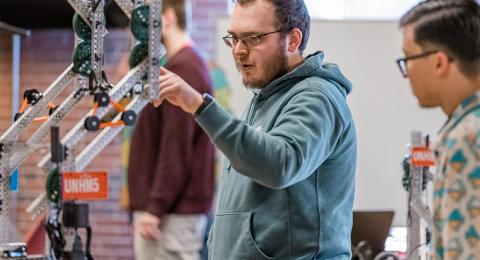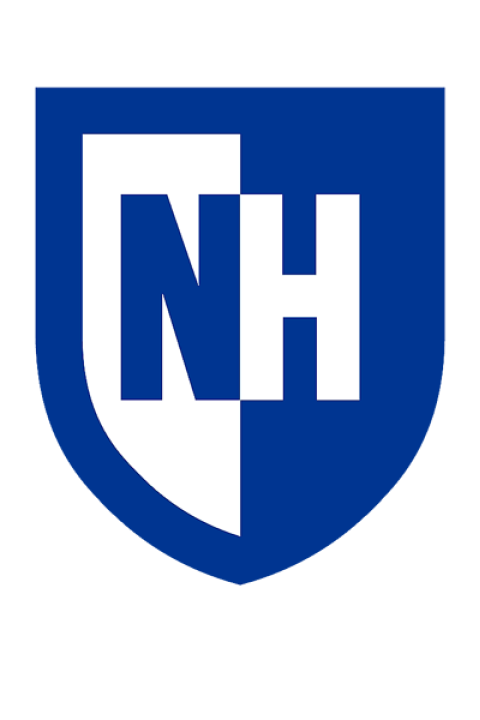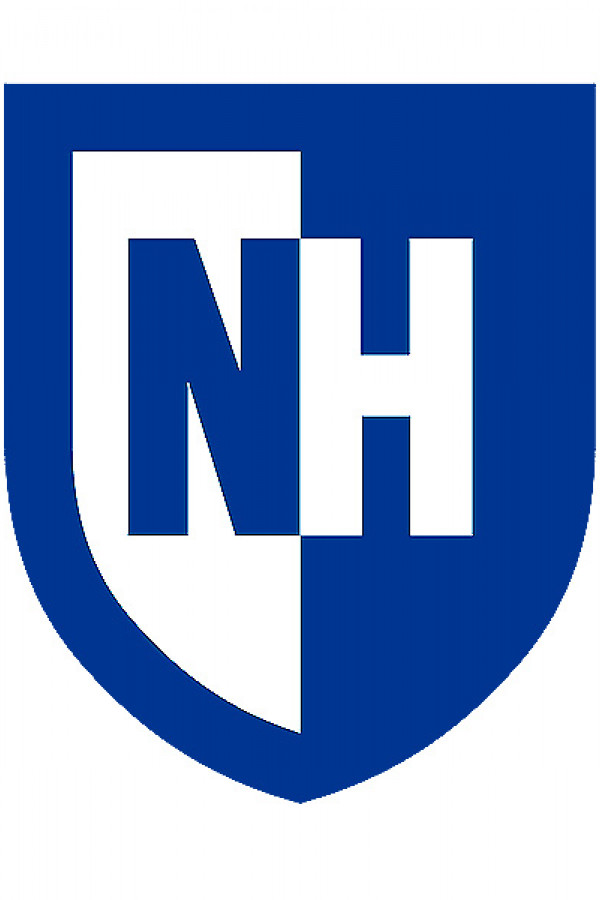Design, Develop and Innovate in the Digital World
Launch or advance your career in one of today’s fastest-growing fields with the computer engineering technology bachelor’s degree program at UNH Manchester. This program blends hardware and software expertise, preparing you to design, test and maintain cutting-edge computing systems. With hands-on experience and industry-aligned coursework, you’ll graduate ready to meet the demand for skilled computer engineers in fields like embedded systems, networking, digital signal processing and more.
What is Computer Engineering Technology?
Computer Engineering Technology (CET) is the fusion of hardware and software engineering, focusing on the design, development and testing of computing systems. Unlike traditional electrical engineering, CET emphasizes both programming and digital hardware, preparing graduates to work with microcontrollers, networking and system architecture. This discipline is essential in industries like telecommunications, automation and cybersecurity, where professionals bridge the gap between electronics and computing solutions.
Why Study Computer Engineering Technology at UNH Manchester?
The computer engineering technology program at UNH Manchester is designed to prepare students for the evolving demands of the tech industry. With an industry-driven curriculum, you’ll gain hands-on experience in embedded systems, digital design, networking and programming using cutting-edge technology. Our strong industry connections and focus on software-hardware integration provide seamless pathways to high-demand careers in fields like cybersecurity, telecommunications, automation and more. Small class sizes and expert faculty ensure a supportive, personalized learning environment, while our affordable and flexible options allow you to earn a UNH degree in a way that fits your goals.
Potential Careers
- Computer Hardware Engineer
- Cybersecurity Specialist
- Digital Systems Designer
- Embedded Systems Engineer
- IoT (Internet of Things) Developer
- Network Systems Administrator
- Robotics Engineer
- Software-Hardware Integration Specialist
- Systems Analyst
- Telecommunications Engineer
Explore Program Details
The computer engineering lab provide hands-on experience in digital system design and embedded computing. Equipped with advanced FPGA development boards, the lab bridges the gap between theory and real-world application, allowing students to design, simulate and implement digital circuits using industry-standard hardware description languages in preparation for careers in hardware design, embedded systems and computing architecture.
Electrical Engineering Lab
The electrical engineering lab houses 10 uniform stations, each equipped with an oscilloscope, industry-standard CAD software and more to give you the hands-on experience that puts you ahead.
Machine Shop
Equipped with vertical and horizontal milling machines, a computer numerical controlled milling machine, a lathe, various saws and a disc sander, the machine shop gives students hands-on skills in mechanical fabrication and testing, better preparing them for high-demand manufacturing roles.
Capstone Lab
Equipped with electronic workspaces, soldering stations, 3D printers and more, the capstone lab offers creative space for seniors working on their culminating projects.
The Computer Engineering Technology program at UNH Manchester equips graduates with the skills needed to design, develop, and maintain computing hardware and software systems. With the increasing demand for professionals who specialize in embedded systems, networking, and cybersecurity, career opportunities in this field continue to grow. According to the Bureau of Labor Statistics, employment in computer and hardware engineering-related fields is projected to grow steadily, driven by advancements in artificial intelligence, automation, and the Internet of Things (IoT).
Engineering technology graduates consistently earn top starting salaries among STEM majors. In its annual salary survey, the National Association of Colleges and Employers (NACE) reports that engineering technology graduates have some of the highest average starting salaries in the field. At UNH Manchester, our strong industry connections ensure students have direct pathways to employment, with many graduates securing positions within six months of graduation. Additionally, the program directly supports New Hampshire’s workforce needs, with the majority of graduates launching successful careers within the state
- Barbara Bancroft, NCC
- Shawn Banker, UNH Durham
- JD Bell, EPE Corporation
- Celine Bilodeau, Eversource
- Alex Chretien, Jetboil intern
- Adam Connolly, BAE Systems
- Joseph Cunningham, NHTI
- Oliver Holt, BAE Systems
- Ken Jones, Previously BAE Sys.
- Dave Lamprey, Osram Sylvania
- Christopher Libby, Velcro
- Dave Luneau, Classco Inc.
- Frank Maliski, Kleenline LLC
- Don Marcotte, NCC
- Keith McBrien, GDS Associates
- Jack Olson, Texas Instruments
- Ed Piekiek, Mitre
- Frank Polito, NHTI
- Jeff Setrin, Safran
- Erich Whitney, Mitre
- Olaf Zwickau, USA Balancing
ENGINEERING TECHNOLOGY PROGRAM EDUCATIONAL OBJECTIVES
The Engineering Technology program objectives are the skills and abilities graduates are expected to demonstrate during the first few years of employment, which include:
- Achieving employment in an engineering technology-related position with appropriate title and compensation.
- Demonstrating engineering technology-related technical problem-solving skills.
- Functioning effectively in diverse and multidisciplinary teams.
- Communicating effectively with both technical and non-technical audiences.
- Adapting to changes in technology through continuous personal and professional development.
- Being capable of assuming increasing professional responsibility.
- Conducting all professional activities with integrity, and demonstrating a sense of social and environmental responsibility.
ENGINEERING TECHNOLOGY STUDENT OUTCOMES
Educational outcomes for students in the Engineering Technology program include, but are not limited to, the following learned capabilities:
- An ability to apply knowledge, techniques, skills and modern tools of mathematics, science, engineering, and technology to solve broadly defined engineering problems appropriate to the discipline.
- An ability to design systems, components, or processes meeting specified needs for broadly defined engineering problems appropriate to the discipline.
- An ability to select and apply the knowledge, techniques, skills, and modern tools of the discipline to broadly defined engineering technology activities.
- An ability to conduct standard tests, measurements, and experiments and to analyze and interpret the results to improve processes.
- An ability to function effectively as a member as well as a leader on technical team.
- An ability to identify, analyze, and solve broadly defined engineering technology problems.
- An ability to apply written, oral, and graphical communication in both technical and non-technical environments; and an ability to identify and use appropriate technical literature.
- An understanding of the need for and an ability to engage in self-directed continuing professional development.
- An understanding of and a commitment to address professional and ethical responsibilities including a respect for diversity.
- A knowledge of the impact of engineering technology solutions in a societal and global context.
- A commitment to quality, timeliness, and continuous improvement.
COMPUTER ENGINEERING TECHNOLOGY STUDENT OUTCOMES
- The application of engineering principles to analyze and solve technical challenges in computing and automation.
- The ability to integrate hardware and software through development, testing and troubleshooting of computer firmware.
- The ability to design and program microcontrollers, digital circuits and embedded devices for real-world applications.
- The application of networking protocols, data communication and security principles to protect digital infrastructure.
- The ability to create and optimize digital logic systems and evaluate and improve computing architectures for performance, efficiency and reliability.
-
Associate Professor/Affiliate Associate ProfessorEmail: Michael.Jonas@unh.eduPhone: (603) 641-4352
-
Associate ProfessorChair, Department of Applied Engineering and SciencesEmail: Christopher.LeBlanc@unh.eduPhone: (603) 641-4323
-
Associate ProfessorAssistant Professor, Mechanical Engineering TechnologyEmail: Sean.Tavares@unh.eduPhone: (603) 641-4322
-
Adjunct Faculty
Curriculum & Requirements
Computer Engineering Technology (CET) is the fusion of hardware and software engineering, focusing on the design, development and testing of computer firmware. Unlike traditional electrical engineering, CET emphasizes both programming and digital hardware, preparing graduates to work with microcontrollers, networking and system architecture. This discipline is essential in industries like telecommunications, automation and cybersecurity, where professionals bridge the gap between electronics and computing solutions.
Sample Degree Plan
This sample degree plan serves as a general guide; students collaborate with their academic advisor to develop a personalized degree plan to meet their academic goals and program requirements.
| First Year | ||
|---|---|---|
| Fall | Credits | |
| MATH 418 | Analysis and Applications of Functions | 4 |
| ENGL 401 | First-Year Writing | 4 |
| ET 431 | Circuit Analysis I | 4 |
| COMP 424 | Applied Computing 1: Foundations of Programming | 4 |
| Credits | 16 | |
| Spring | ||
| MATH 425 | Calculus I | 4 |
| ET 421 | Digital Electronics I | 4 |
| ET 432 | Circuit Analysis II | 4 |
| COMP 550 | Networking Concepts | 4 |
| Credits | 16 | |
| Second Year | ||
| Fall | ||
| MATH 426 | Calculus II | 4 |
| ET 522 | Digital Electronics II | 4 |
| ET 541 | Electronic Devices | 4 |
| COMP 525 | Data Structures Fundamentals | 4 |
| Credits | 16 | |
| Spring | ||
| ET 590 | Embedded Microcontrollers | 4 |
| PHYS 407 | General Physics I | 4 |
| COMP 530 | Machine and Network Architecture | 4 |
| Discovery Course | 4 | |
| Credits | 16 | |
| Third Year | ||
| Fall | ||
| ET 680 | Communications and Fields | 4 |
| ET 671 | Digital Systems | 4 |
| COMP Elective | 4 | |
| Discovery Course | 4 | |
| Credits | 16 | |
| Spring | ||
| ET 625 | Technical Communications | 4 |
| ET 660 | FPGA Design with HDL | 4 |
| COMP 625 | Data Structures and Algorithms | 4 |
| Discovery Course | 4 | |
| Credits | 16 | |
| Fourth Year | ||
| Fall | ||
| COMP 560 | Ethics and the Law in the Digital Age | 4 |
| COMP 720 | Database Systems and Technologies | 4 |
| ET 791 | Electrical Engineering Technology Project | 4 |
| Discovery Course | 4 | |
| Credits | 16 | |
| Spring | ||
| ECON 401 | Principles of Economics (Macro) | 4 |
| ET 791 | Electrical Engineering Technology Project | 4 |
| ET 788 | Introduction to Digital Signal Processing | 4 |
| Discovery Course | 4 | |
| Credits | 16 | |
| Total Credits | 128 | |
Degree Requirements
All Major, Option and Elective Requirements as indicated.
*Major GPA requirements as indicated.
Major Requirements
Courses required in the major must be completed with a minimum grade of C- and students must attain a minimum GPA in the major of 2.0.
| Code | Title | Credits |
|---|---|---|
| Required Courses | ||
| COMP 424 | Applied Computing 1: Foundations of Programming | 4 |
| COMP 525 | Data Structures Fundamentals | 4 |
| COMP 530 | Machine and Network Architecture | 4 |
| COMP 550 | Networking Concepts | 4 |
| COMP 560 | Ethics and the Law in the Digital Age | 4 |
| COMP 625 | Data Structures and Algorithms | 4 |
| COMP 720 | Database Systems and Technologies | 4 |
| ECN 411/411W | Introduction to Macroeconomic Principles | 4 |
| or ECN 412/412W | Introduction to Microeconomic Principles | |
| ET 421 | Digital Electronics I | 4 |
| ET 660 | FPGA Design with HDL | 4 |
| ET 431 | Circuit Analysis I | 4 |
| ET 432 | Circuit Analysis II | 4 |
| ET 522 | Digital Electronics II | 4 |
| ET 541 | Electronic Devices | 4 |
| ET 590 | Embedded Microcontrollers | 4 |
| ET 625 | Technical Communications | 4 |
| ET 671 | Digital Systems | 4 |
| ET 680 | Communications and Fields | 4 |
| ET 788 | Introduction to Digital Signal Processing | 4 |
| ET 791 | Electrical Engineering Technology Project | 8 |
| MATH 425 | Calculus I | 4 |
| MATH 426 | Calculus II | 4 |
| PHYS 407 | General Physics I | 4 |
| Elective | ||
| COMP Elective: Select any COMP course 500-level (or higher) not already required. | 4 | |
| Total Credits | 100 | |
Program Learning Outcomes
General Engineering Technology
- Problem Solving: an ability to apply knowledge, techniques, skills and modern tools of mathematics, science, engineering, and technology to solve broadly-defined engineering problems appropriate to the discipline.
- System Design: an ability to design systems, components, or processes meeting specified needs for broadly-defined engineering problems appropriate to the discipline.
- Communication Skills: an ability to apply written, oral, and graphical communication in broadly-defined technical and non-technical environments; and an ability to identify and use appropriate technical literature.
- Testing, Measurements, and Interpretation: an ability to conduct standard tests, measurements, and experiments and to analyze and interpret the results to improve processes.
- Teamwork: an ability to function effectively as a member as well as a leader on technical teams.
Computer Engineering Technology
- Application of electric circuits, computer programming, associated software applications, analog and digital electronics, microcontrollers, operating systems, local area networks, and engineering standards to the building, testing, operation, and maintenance of computer systems and associated software systems.
- Application of natural sciences and mathematics at or above the level of algebra and trigonometry to the building, testing, operation, and maintenance of computer systems and associated software systems.
- Analysis, design, and implementation of computer system hardware and software.
- Application of project management techniques to computer systems.
- Utilization of statistics/probability, transform methods, discrete mathematics, or applied differential equations in support of computer systems and networks.









